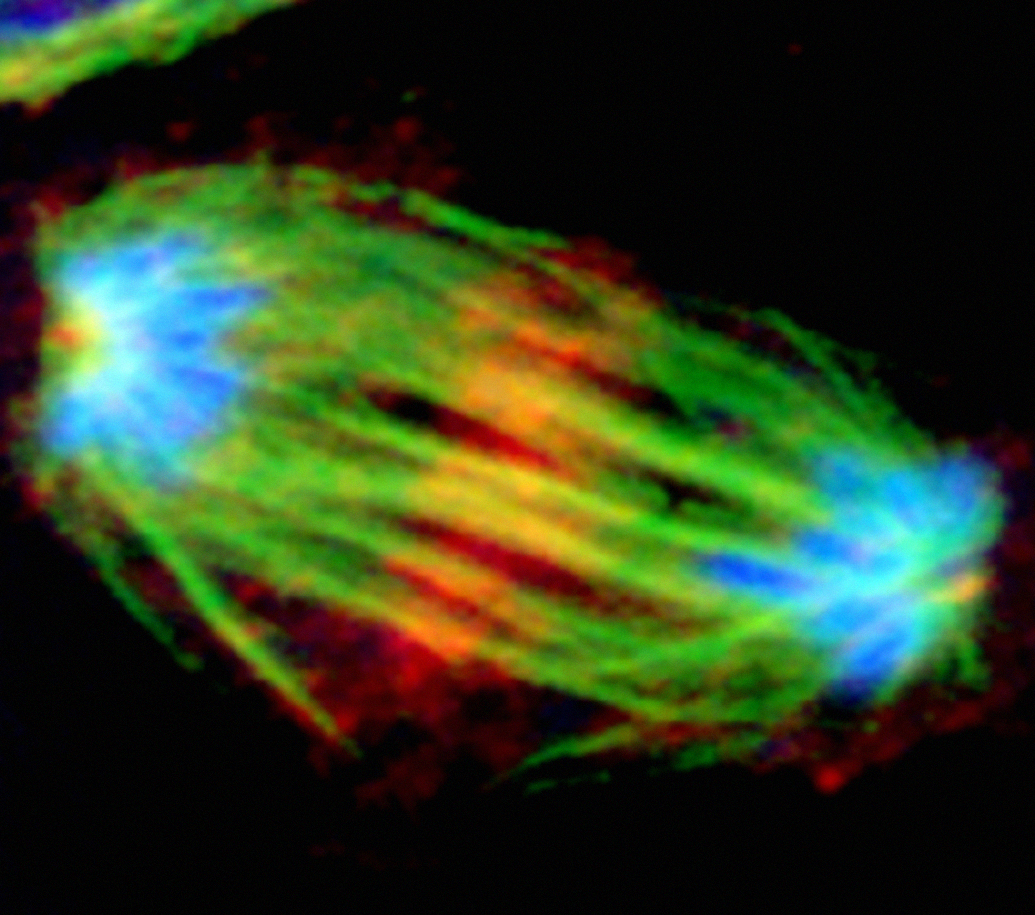Cell Division & Genomic Stability
ABOUT
Our group was formed more than 30 years ago by Claudio Sunkel who carried out an extensive gene discovery program to understand the fundamental mechanisms that ensure the fidelity of chromosome segregation during cell division. Using Drosophila, we identified, a number of conserved and essential genes required for the regulation of mitotic progression including the first POLO–like kinase. Subsequently, the group tackled the characterization of proteins involved in chromosome structure and of components of the Spindle Assembly Checkpoint that monitors kinetochore-microtubule interactions. We are currently organized into two lines of research, each headed by independently funded PIs:
Claudio Sunkel (Co-PI Pedro Resende) - Aneuploidy and tumorigenesis
We are developing tumor models in Drosophila caused by deregulation of chromosome segregation. We want to understand the molecular events that take place in tumor formation and relate those to conserved pathways in human cancer cells. We found that Drosophila adult intestinal stem cells do not activate programmed cell death upon aneuploidy induction, and instead increase their proliferation rate, accumulating and leading to tissue dysplasia, a phenotype that mimics early stages of tumor development. We have also found that aneuploid stem cells have the capacity to invade neighboring tissues. We are focused on understanding what are the molecular players involved in stem cell resistance to cell death and cellular transformation in the context of aneuploidy.
Carlos Conde - Mechanistic principles of (un)faithful cell division
We focus on the molecular details that drive kinetochore-microtubule interactions and mitotic checkpoint signalling and how defects in these processes impact on chromosomal instability (CIN) and tumorigenesis. The main questions that motivate our research are:
- How do kinetochores become correctly attached to spindle microtubules?
- How do cells coordinate cell cycle progression with the attachment status of kinetochores?
- What is the mechanistic basis of CIN in tumour cells?
We work in frame of a growing network of collaborations to address these questions in a comprehensive manner and with a broad methodological portfolio: (i) combine biochemistry and structural biology with functional analysis in cells to unveil novel mechanistic insight, (ii) establish primary 2D and 3D cell cultures from human tumours to investigate the occurrence and causes of segregation errors and CIN (iii) and use animal models to test in vivo their oncogenic potential and possible suppressive strategies. Our ultimate goal is to generate critical knowledge that advances our understanding of genome partitioning at the molecular, cellular and organismal levels.
RESEARCH
Claudio Sunkel
Our main objective has been to identify and characterize the molecular mechanisms involved in faithful chromosome segregation during mitosis. Our major contribution to the field was the cloning and characterization of the POLO-like kinase family of mitotic regulators. We demonstrated that Polo is required for centrosome organization and function, for regulation of the spindle and in kinetochore assembly. Later we identified and characterized the CLASP family of microtubule regulators and demonstrated their role in mitosis. More recently, we have devoted our attention to the Spindle Assembly Checkpoint that monitors microtubule-kinetochore attachment and chromosome segregation. We characterized the role of MAD2, BUBR1, BUB3 and MPS1 in this process and integrated our results into a molecular pathway that also involves Aurora B and POLO. We have studied the molecules involved in mitotic chromosome structure and analyzed the role of condensins showing for the first time their essential role in sister chromatid resolution prior to anaphase onset. We also localized for the first time the cohesion subunit DRAD21 to the centromere of mitotic chromosomes.
Carlos Conde
We combine mechanistic in vitro methodology with in vivo studies to understand how genome integrity is preserved in dividing cells. We uncovered POLO-mediated regulation of the RZZ-Spindly-Dynein axis as an important mechanism to prevent erroneous kinetochore-microtubule interactions (Barbosa et al., 2020 EMBO J) and found that POLO promotes MPS1 activity at kinetochores to ensure robust SAC signalling (Conde et al., 2013 EMBO J). We have also shown for the first time that a functional SAC requires MPS1-mediated release of checkpoint proteins from nuclear pores during prophase (Cunha-Silva et al JCB 2020) and that PP1 dephosphorylates and inactivates MPS1 to ensure swift SAC silencing and timely mitotic exit (Moura et al eLife 2017). These findings have contributed to expand our understanding of the basic principles that govern faithful chromosome segregation.

Team
Selected Publications
Aneuploidy in intestinal stem cells promotes gut dysplasia in Drosophila. Journal of Cell Biology217(11):3930-3946, 2018. [Journal: Article] [CI: 21] [IF: 8,9]
DOI: 10.1083/jcb.201804205 SCOPUS: 85056258220
Resende L.P.F., Truong M.E., Gomez A., Jones D.L.
Intestinal stem cell ablation reveals differential requirements for survival in response to chemical challenge. Developmental Biology424(1):10-17, 2017. [Journal: Article] [CI: 15] [IF: 3,3]
DOI: 10.1016/j.ydbio.2017.01.004 SCOPUS: 85013484840
Moura M., Osswald M., Leça N., Barbosa J., Pereira A.J., Maiato H., Sunkel C.E., Conde C.
Protein phosphatase 1 inactivates Mps1 to ensure efficient spindle assembly checkpoint silencing. eLife6:, 2017. [Journal: Article] [CI: 47] [IF: 7,6]
DOI: 10.7554/eLife.25366 SCOPUS: 85019849461
Conde C., Osswald M., Barbosa J., Moutinho-Santos T., Pinheiro D., Guimarães S., Matos I., Maiato H., Sunkel C.E.
Drosophila Polo regulates the spindle assembly checkpoint through Mps1-dependent BubR1 phosphorylation. EMBO Journal32(12):1761-1777, 2013. [Journal: Article] [CI: 43] [IF: 10,7]
DOI: 10.1038/emboj.2013.109 SCOPUS: 84879459640
Da Silva S.M., Moutinho-Santos T., Sunkel C.E.
A tumor suppressor role of the Bub3 spindle checkpoint protein after apoptosis inhibition. Journal of Cell Biology201(3):385-393, 2013. [Journal: Article] [CI: 52] [IF: 9,7]
DOI: 10.1083/jcb.201210018 SCOPUS: 84878663198
Conde C., Osswald M., Sunkel C.E.
All together now: Polo joins the kinase network controlling the spindle assembly checkpoint in Drosophila. Fly7(4):, 2013. [Journal: Article] [CI: 5] [IF: 1,5]
SCOPUS: 84887418454


